Hong Shao Rou (Red Braised Pork Belly)
Hong shao rou, also known as red braised pork belly, is a robust, highly aromatic dish from the world of Chinese cuisine. Succulent pork is braised in a sticky sweet sauce that will blow your mind. Make this traditional Asian delicacy today!
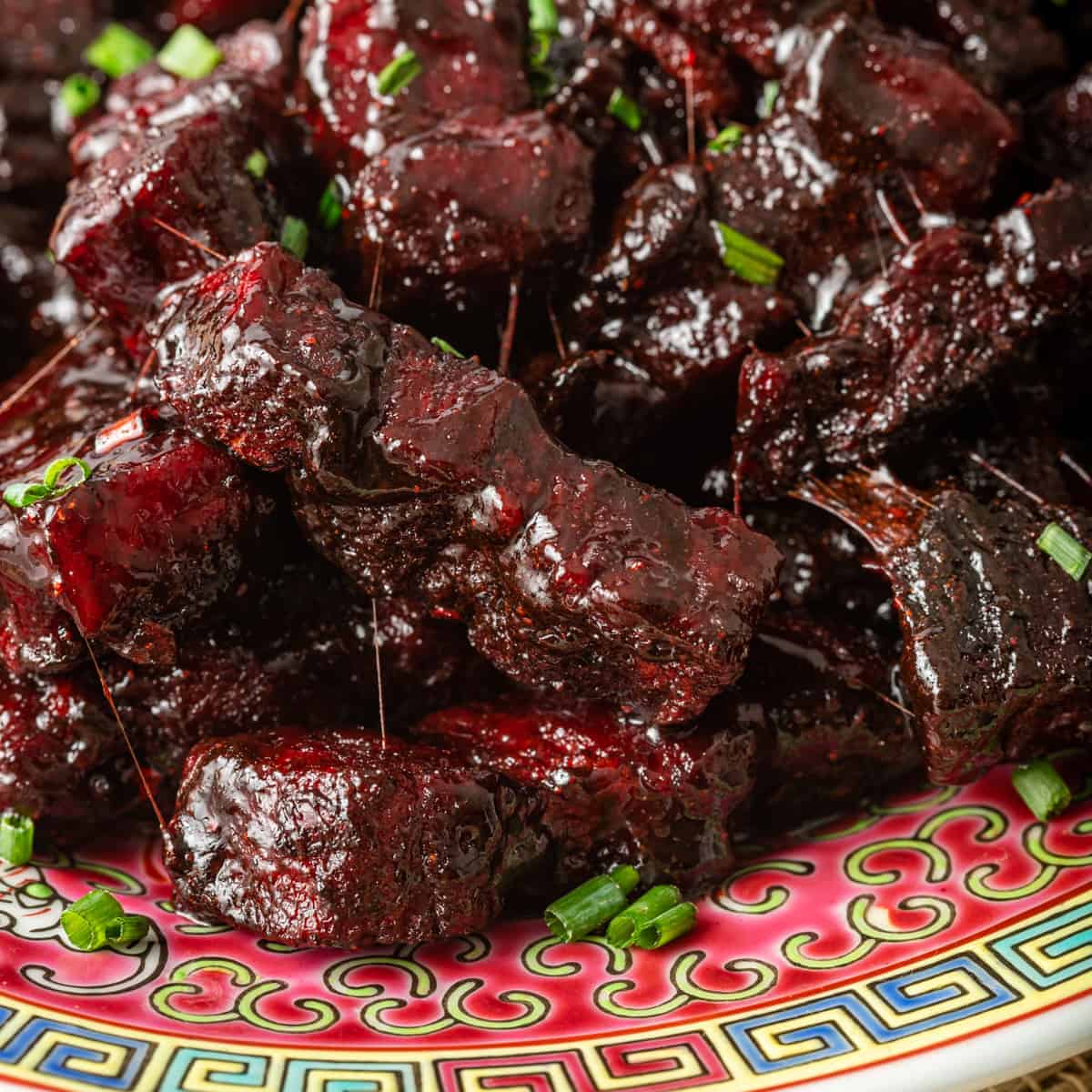
This recipe for hong shao rou is nothing short of a flavor bomb! This time-honored Chinese masterpiece is savory, sweet, and tangy with a melt-in-your-mouth tenderness. The robust flavors of soy sauce, rice wine, and brown sugar team up with zesty ginger, spicy serrano, and more to create an intensely delicious braising sauce.
Making red braised pork belly does require a number of steps and a bit of patience, but I guarantee your efforts are worth it. This is one of my new favorite dishes to make for holiday potlucks or anytime I want to knock the socks off my dinner guests. We’re talking pork candy here!

Table of Contents
For more irresistible Chinese recipes, check out my Mongolian Beef, Sticky Chicken, and Szechuan Pork.
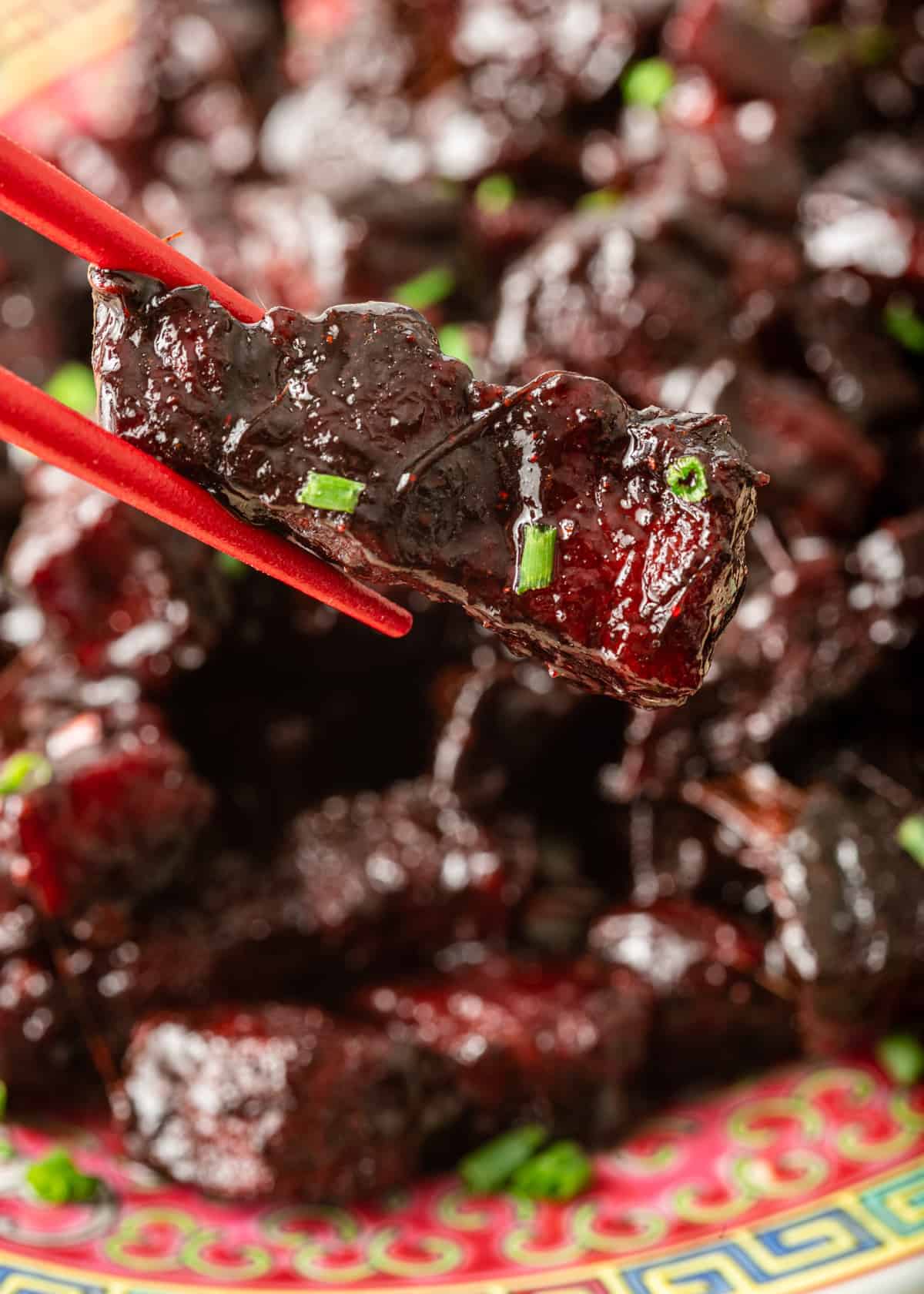
- Pork Belly – Has the perfect ratio of fat and meat to make it intensely flavorful and succulent.
- Ginger – Fresh and ground ginger are used to add layers of earthy, warming flavor.
- Serrano Chile – If no serrano is available, any fresh chile pepper will do.
- Brown Sugar – Adds an earthy sweetness and a red hue as it caramelizes.
- Soy Sauce – This dish is usually made with dark soy sauce, but feel free to substitute regular, low sodium, or gluten-free as needed.
- Rice Wine – Balances out the sweetness and adds a bright, tangy flavor. Look for Shaoxing rice wine at your local Asian market or use rice wine vinegar as a substitute.
- Red Pepper Flakes – Offer a balancing dash of zesty heat.
- Chinese Five Spice – A warming, aromatic blend of cinnamon, cloves, star anise, peppercorns, and fennel. Find it at an Asian market or check out my easy DIY recipe.
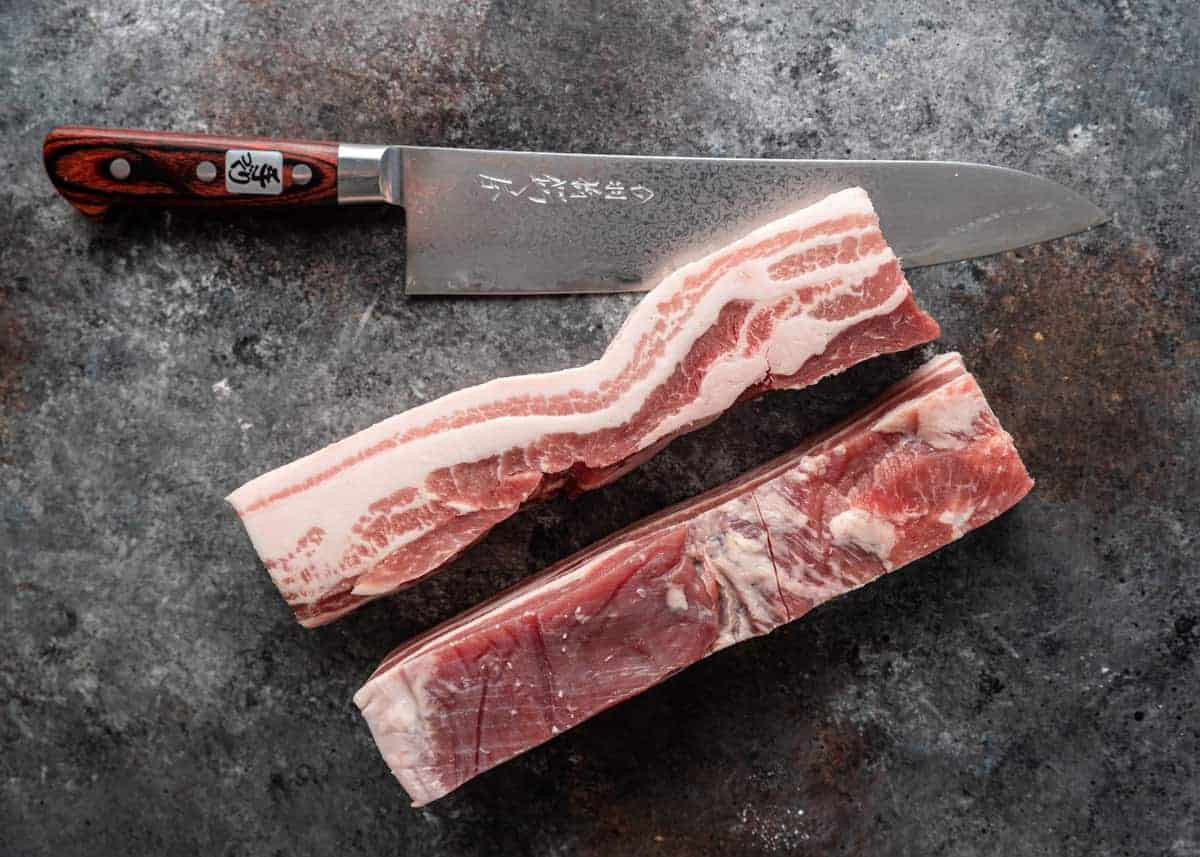
Picking out pork belly
The Chinese authentic red braised pork always uses a skin-on pork belly, which I find at most Chinese markets. The pork belly used in today’s recipe is from Costco and is skinless. If you don’t like pork skin (it’s great for making crackling!), the skinless type works well. I’ve found Korean and Japanese markets sell skinless pork belly, too like H Mart here in the Portland area.
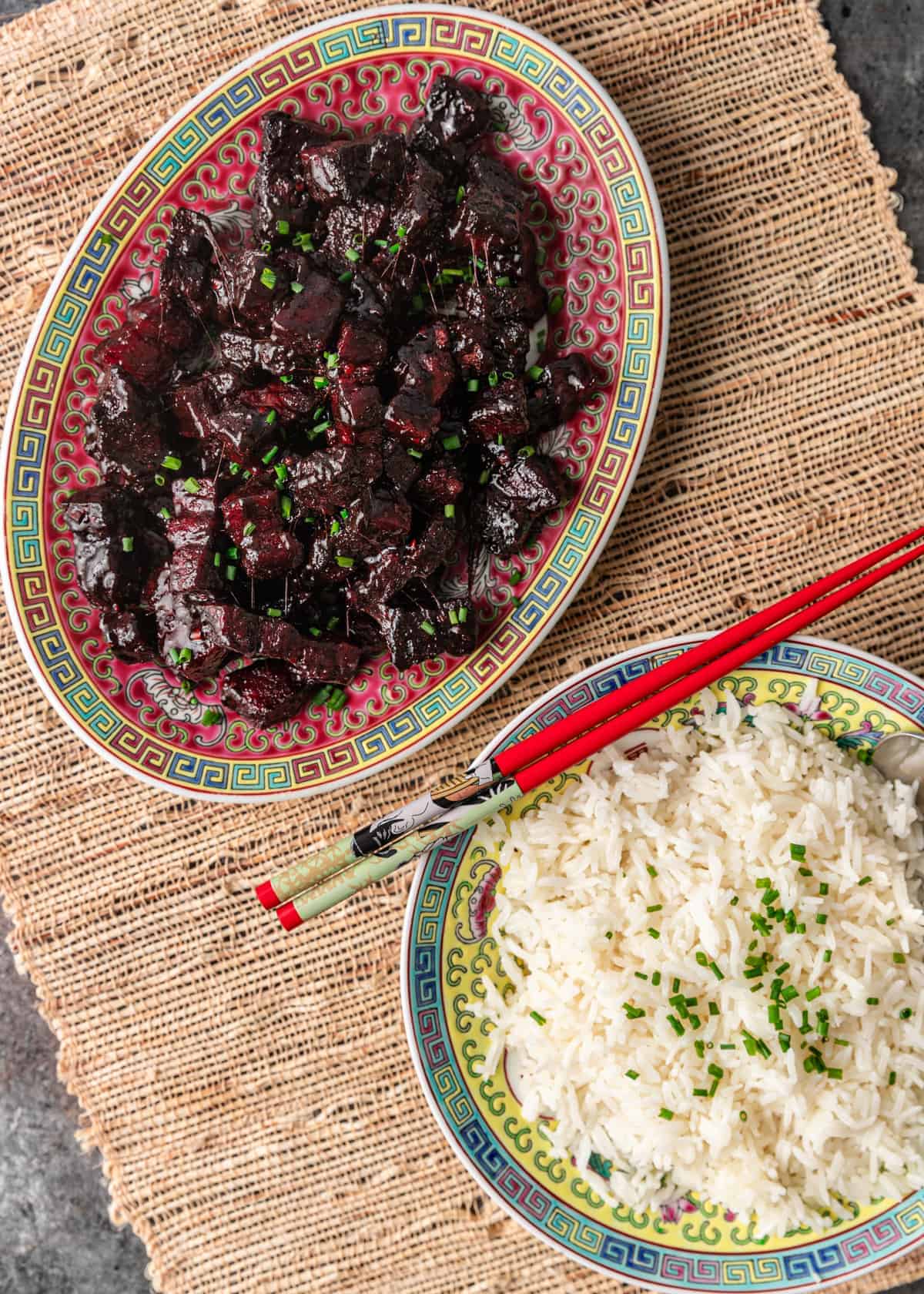
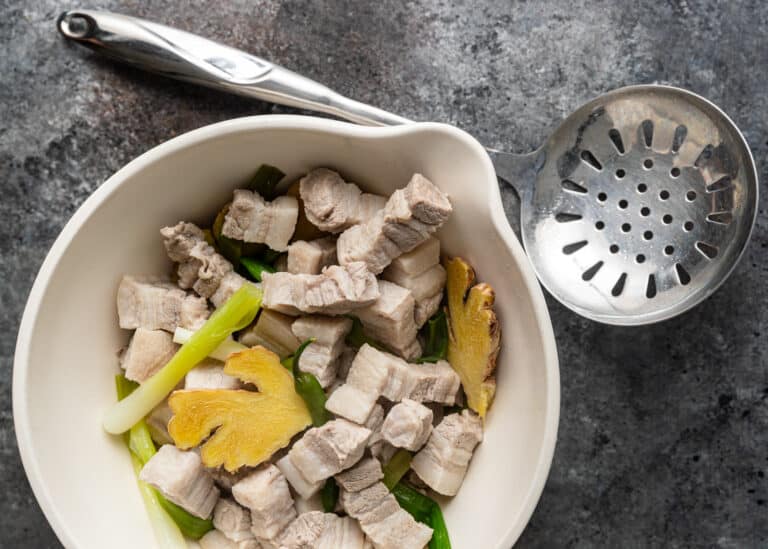
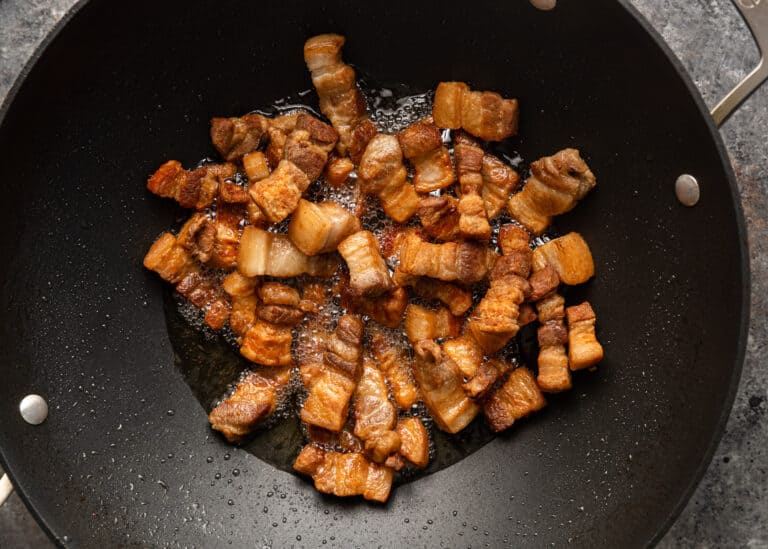
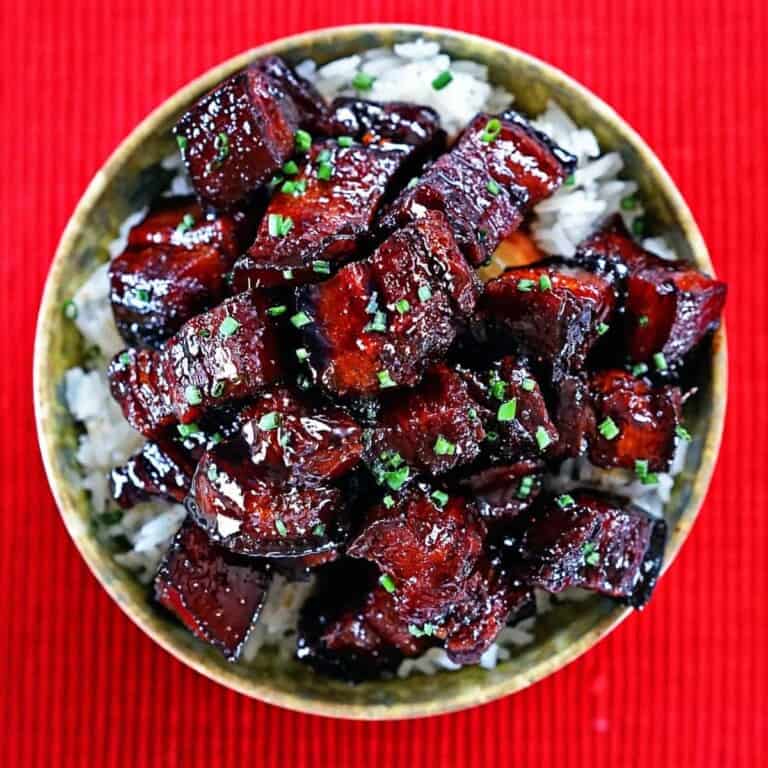
- Prepare Ingredients. Slice the pork belly into 1-inch cubes. Trim the tips off of the green onions, then cut the remainder in half. Peel the fresh ginger and slice it into 4 equal parts. Finally, slice the chile pepper in half lengthwise and set everything aside.
- Blend the Sauce. Combine the soy sauce, rice wine vinegar, ground ginger, red pepper flakes, and Chinese 5 spice blend in a bowl. Stir and set aside.
- Simmer the Pork. Bring 4 cups of water to boil in a large wok. Toss in the fresh ginger, green onions, chile peppers, and pork belly, then bring the mixture back to a boil. Reduce the heat to low and simmer for 10 minutes. Remove the pork belly from the wok, allow it to cool, then dry it with a paper towel. Discard the liquid and other ingredients from the wok.
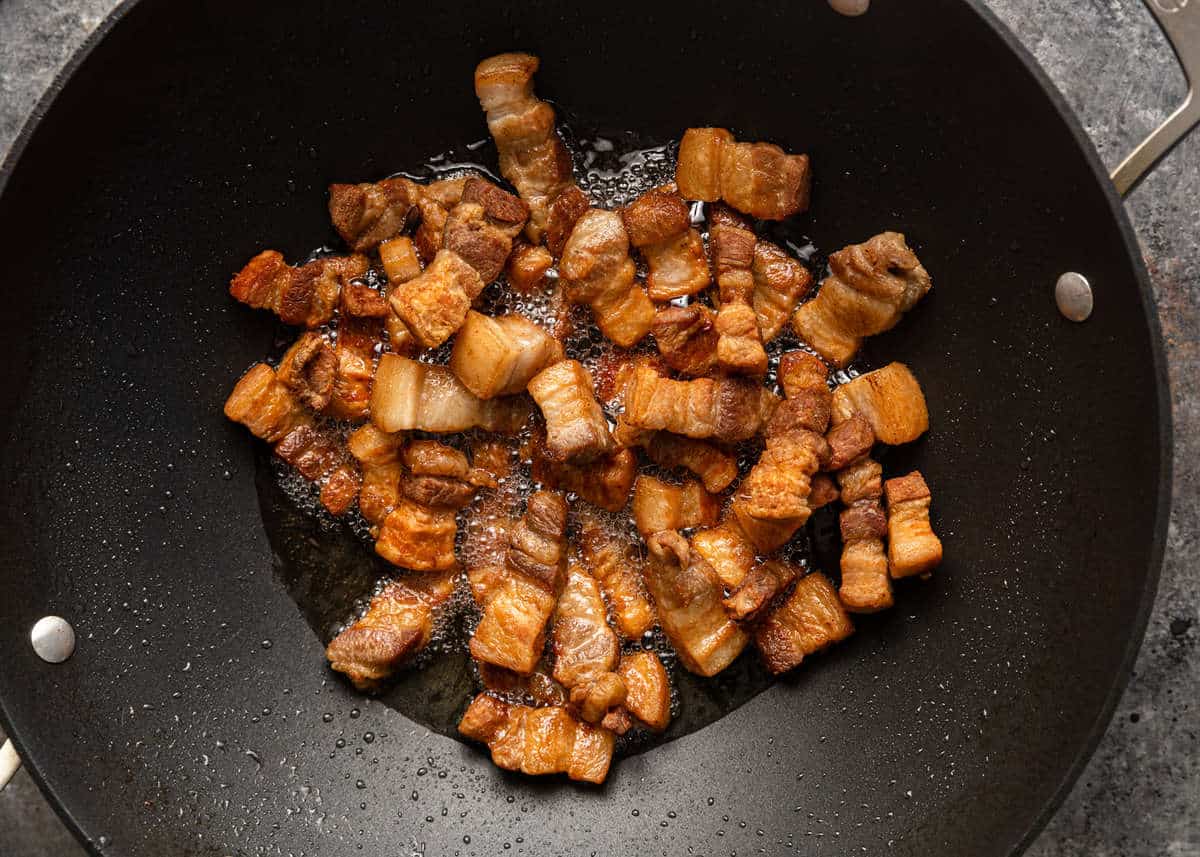
- Brown the Pork. With the wok still hot, add the vegetable oil followed by the pork belly pieces. Stir fry, making sure to brown the pork on all sides. Remove the pieces from the wok and transfer them to a paper towel-lined plate to drain. Reserve at least 2 tablespoons of the rendered fat in the wok, discarding the rest.
- Combine All Ingredients. With the wok over medium heat, add the brown sugar and let it melt until it bubbles. Next, quickly and carefully stir in a cup of hot water, watching for sputters. Add the soy and spice mix, followed by the browned pork belly pieces, and stir to coat evenly and combine. Reduce the heat to low, cover the wok, and simmer for about 30-40 minutes or until the pork belly shreds easily with a fork when pressed.
- Cool & Serve. Take the lid off the wok, remove it from heat, and allow at least 5 minutes for the sauce to thicken. Serve pork belly over a pile of steamed rice, topped with fresh chives.
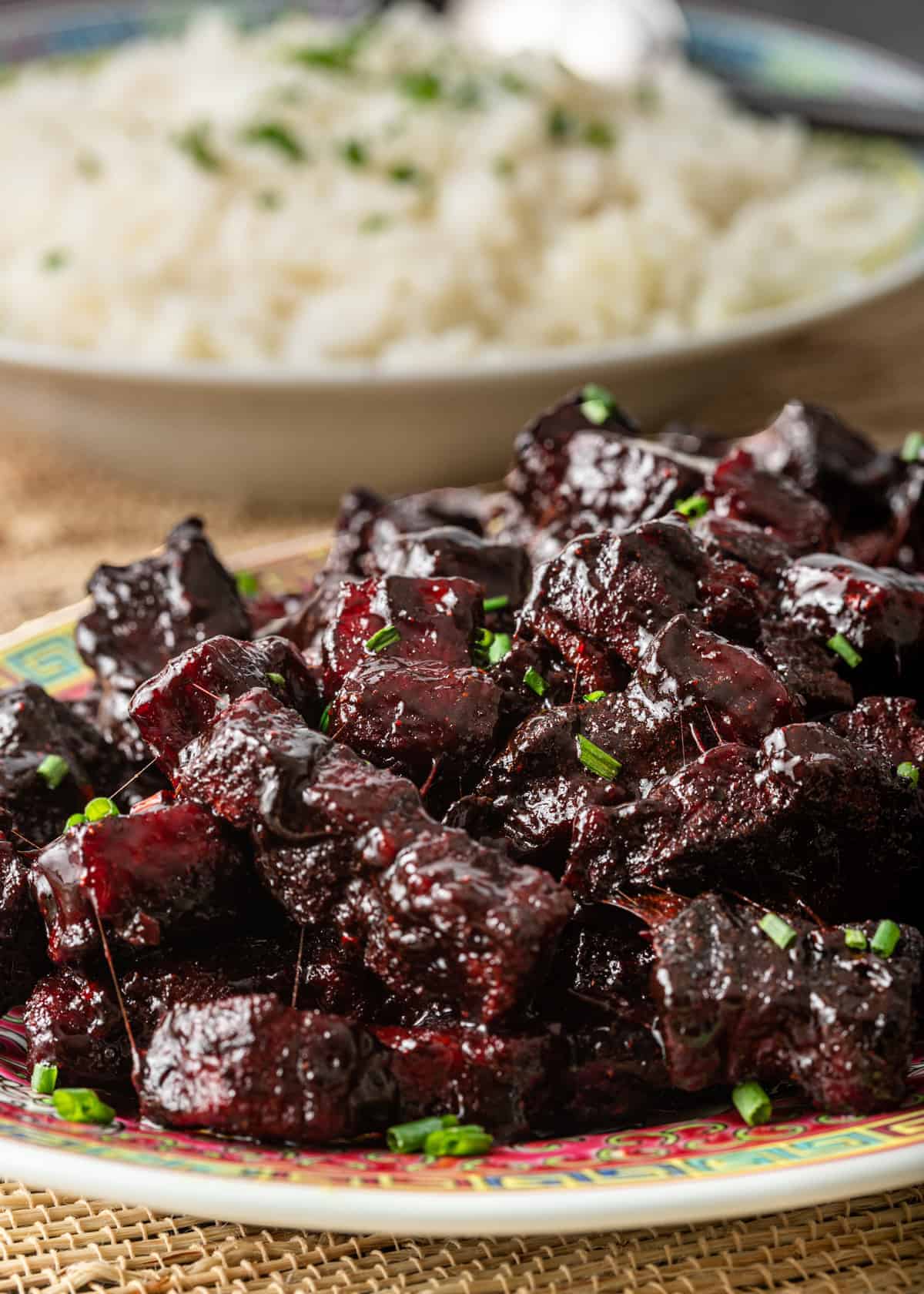
This mouthwatering red braised pork is traditionally served with Steamed Rice and stir-fried vegetables like this Bok Choy Stir Fry or these Asian Green Beans.
To round out your meal, I recommend adding fresh Cucumber Salad, a bowl of Egg Drop Soup, and a side of these yummy Scallion Pancakes.
Hong shao rou is commonly called “Shanghai-style” braised pork, leading many to believe that is where the credit is due. However, it most likely originated in the province of Hunan.
Regardless of which region originally created this dish, it is wildly popular throughout China today, with each province having its own slight variations. In recent years, the rest of the world has finally caught on, and you can find red braised pork belly in Chinese restaurants around the globe.
When the rock sugar or brown sugar (used here) is added to the hot oil, it caramelizes and turns a deep red-brown color which gets intensified by the addition of soy sauce. As the dish simmers for an extended period of time, the color infuses into the meat, putting the red in your red braised pork belly.
This recipe for hong shao rou is free from any additives, but some cooks might add red fermented bean curd or other ingredients to intensify the color. Don’t feel like you failed if the color doesn’t match what you see at the restaurant!
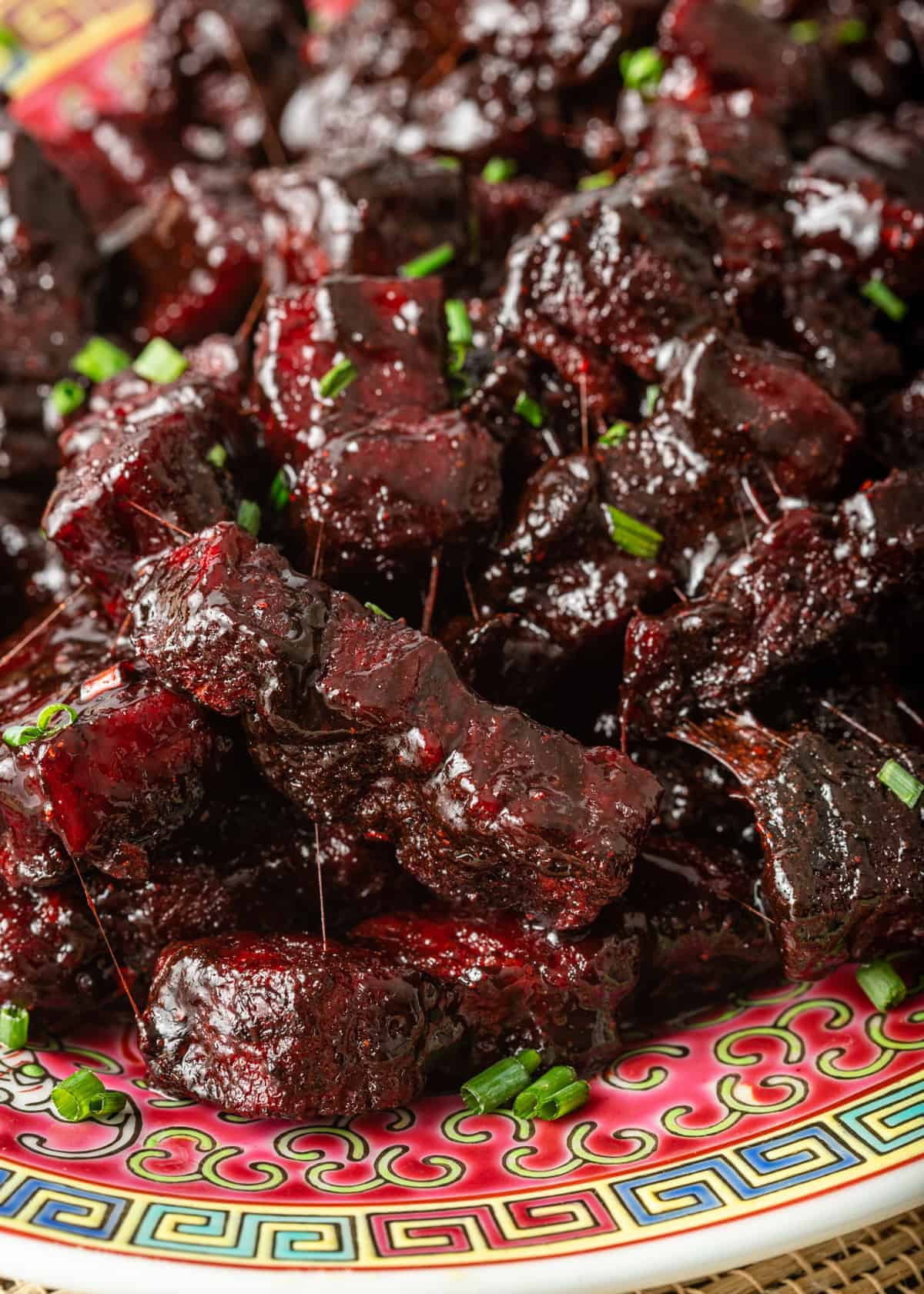
Share this recipe on Pinterest!
Love this recipe? Share it with the world on Pinterest.
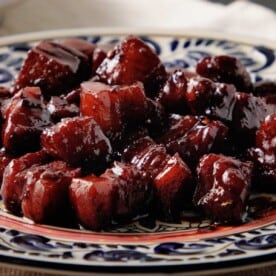
Hong Shao Rou (Red Braised Pork Belly)
Ingredients
- 1 lb pork belly
- 4 green onions
- 4 inch fresh ginger peeled
- 1 serrano chile or other fresh chile of choice
- 1 tbsp vegetable oil
- 1/4 cup brown sugar
- 1/4 cup soy sauce regular, dark, or low-sodium
- 1 tbsp Shaoxing rice wine or rice wine vinegar
- 1 tbsp ground ginger
- 2 tsp red pepper flakes
- 1 tsp Chinese Five Spice
- fresh chives finely chopped, for garnish
Instructions
- Cut the pork belly into 1-inch cubes. Trim the ends off the green onions and cut in half. Slice the peeled ginger into four equal pieces. Slice the chile lengthwise. Set all aside.
- In a bowl add the soy sauce, rice wine vinegar, ground ginger, red pepper flakes and Chinese Five Spice. Stir and set aside.
- In a large wok bring 4 cups of water to boil. Add the sliced ginger, onions, chile and pork belly. Bring water back to a boil and turn heat to simmer, cook for 10 minutes. Remove pork belly from wok and dry with paper towel when cool enough to handle. Discard water and contents from wok.
- Add vegetable oil to hot wok and add pork belly pieces. Stir fry to brown on all sides. Remove from wok and drain on paper towel, set aside. Leave at least 2 tablespoons of rendered fat in wok, discard remainder.
- To your wok add the brown sugar and cook over medium heat until the sugar melts and bubbles. Carefully and quickly add 1 cup of hot water to the wok and stir to mix thoroughly (this will sputter). Add the soy sauce/spice mixture and the browned pork belly to the wok. Stir to coat the pork, cover and simmer on low for 30-40 minutes or until tender and shreds easily when pressed.
- Remove the lid and allow sauce to cook and thicken for 5 minutes more. Serve this with steamed rice and top with finely chopped chives.
Video
Nutrition
The information shown is an estimate provided by an online nutrition calculator. It should not be considered a substitute for a professional nutritionist’s advice.
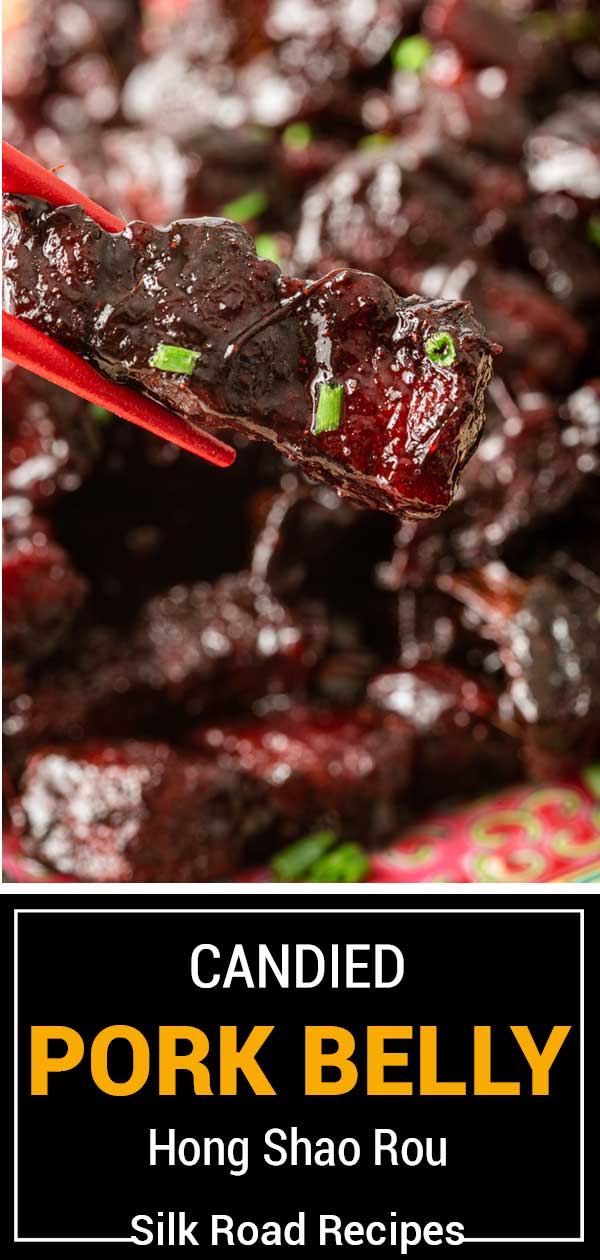
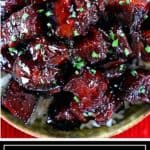
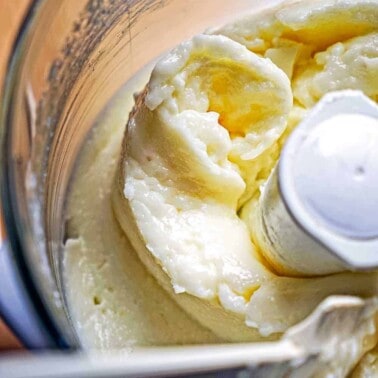
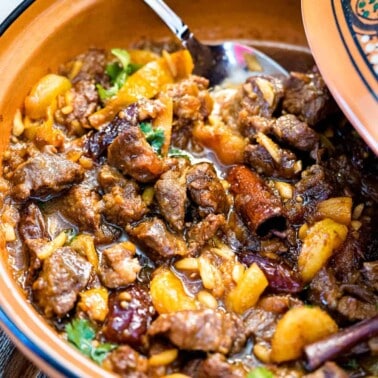
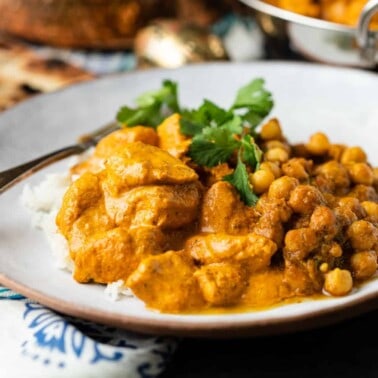
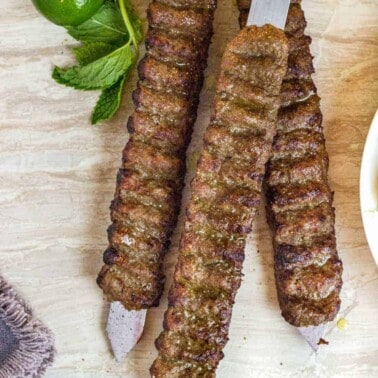








I swear this recipe gets better every time I cook it. Firm favourite in this house! Thanks again Kevin!
Excellent! This makes me smile. Thanks so much John. 🙂
😍This recipe was SO GOOD and easy to make! I love it!!😍
Oh thanks so much Miranda! Thanks for following along here.
Delicious. Some thoughts though- not sure all the aromatics added to the blanching step do much since it simmers for only a few minutes.
also, I had to leave the lid on and simmer at the “saucy” step for about 50 minutes until the belly was soft and tender. By then the sauce had thickened well. Maybe I just simmered too low for that time, but 30 minutes wasn’t enough.
overall great recipe!
Appreciate the feedback and for trying this one Ben. Cheers!
This recipe is amazing!! My in-laws always request I make it when we have a get together but I usually add more Serrano since my family loves spice. Thanks for making me look good 😉
Always here to help Veronica, thanks for following along!
Looks delicious, but how do you not end up with a thick 2cm layer of pork fat on top of the braising liquid when finished? Every time I’ve tried this dish I wind up with almost a half pint of rendered fat at the end!
Thanks! I do state in Step 3 “… Remove pork belly from wok and dry with paper towel when cool enough to handle. Discard water and contents from wok.” I do get a layer of fat, but no where near what you are getting. Wow. Guess it depends on the amount of fat on the pork belly really.
Huh… wonder what I’m doing wrong then. It still tastes amazing after I ladle off the fat though. I’ll try again!
Wow, what a treat!
I am considering doubling and taking this to our family Christmas dinner. Maybe as a side or an appetizer…
Thanks so much, Pam. If your family loves pork belly like mine does, you’re definitely going to need a double batch! 😉 Merry Christmas!